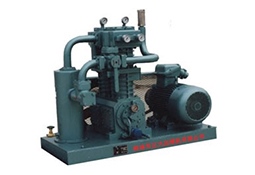Sales Department: 0552-3825188 0552-3825333
Accessories Department: 15955260712
Company Fax: 0552-3825255, 3825200
CNG Department: 13865028777 13865066118
After-sales service: 0552-3825155 0552-3825156
Company Address: No. 2581, Shuangdun Road, Huaishang District, Bengbu, Anhui Province
Company email: zdysj@126.com ahzdysj@126.com
How to operate ammonia compressor safely?
Ammonia compressor compresses gaseous ammonia into liquid ammonia. The compressor is piston type. So how to operate ammonia compressor safely?
1. Inspection before startup
1. Check whether the setting values of each automatic protection relay meet the startup requirements.
2. Check whether the oil level meets the requirements. The oil level should be kept at 1\/22\/3 of the oil sight glass.
3. Check the status of all valves in the system. The suction stop valve, refueling valve, and bypass valve should be closed. Other valves on the oil and gas circulation pipelines should be opened. Pay special attention to the fact that all valves on the pipeline from the compressor exhaust to the condenser must be opened and the oil system must be unobstructed.
4. Check whether the water channels of the condenser, evaporator and oil cooler are unobstructed, and whether the water valve and water pump can work normally.
2. Operation process
1. Start the water pump to circulate the water.
2. Open the exhaust stop valve, the valves before and after the oil filter, and the gauge valve.
3. Turn on the power control switch and observe whether the voltage, control light and oil level are normal.
4. Start the oil pump. After it runs normally, open the cooling water valve of the oil cooler.
5. Check whether the energy indicator is at zero position and turn the 4-way valve handle to the load reduction position.
6. Start the compressor, open the suction stop valve, and observe whether the oil pressure is higher than the exhaust pressure by 0.150.3MPa.
7. Increase the load several times and open the liquid supply valve accordingly. If the unit operates normally, continue to increase the load to the required energy position, then move the 4-way valve handle to the stop position to allow the unit to continue to operate under normal conditions.
8. After the unit is running normally, you should pay attention to observe and record the suction pressure, exhaust pressure, suction temperature, exhaust temperature, oil temperature, voltage and current value on time.
3. Normal shutdown
1. Turn the energy regulating 4-way valve handle to the load reduction position, close the liquid supply valve, and close the air intake stop valve.
2. When the slide valve returns to the 4050 percent position, press the host stop button. After the host stops running, close the suction stop valve.
3. After the load is reduced to zero, press the oil pump stop button. The water pump will be stopped or turned on depending on the usage requirements.
4. Cut off the power supply of the unit.

Related News
- How to adjust the air volume of the air compressor?
- The status quo and development trend of compressor technology
- Knowledge about daily maintenance of air compressors
- Reasons for lack of compressor displacement
- What are the common faults of compressors?
- Maintenance of natural gas compressor
- Safe use of vinyl chloride compressors
- Analysis of several common failures of dimethyl ether compressor
- The structure and characteristics of vinyl chloride compressor
- How to maintain the vinyl chloride compressor?
- How to choose a compressor
- How to install the air compressor without oil leakage?
- The main components of carbon monoxide compressor
- How to operate ammonia compressor safely?
- What will happen if the 2-methyl ether compressor is not maintained on time?
- Introduction to the types of nitrogen compressors
- The difference between different lubricants for natural gas compressors
- What is the clearance volume of an ammonia compressor?
- Faulty components caused by the operation of ammonia compressor
- How to set up combustible gas detection points in natural gas compressor rooms



